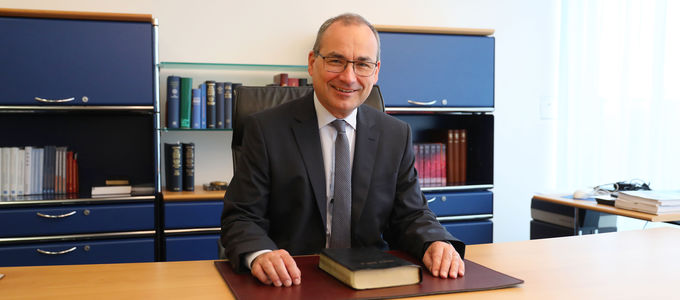Praise and love more
The goal is still the same: the return of Christ. However, the Church is developing. This is what the Chief Apostle made clear in a doctrinal paper that was recently published. He looks back on the way we have covered so far and looks ahead to what still needs to be done.

Inspired by the Spirit, the Chief Apostles have been able to better respond to the mission with which the Lord has entrusted them, Chief Apostle Jean-Luc Schneider says as he pays tribute to his predecessors. This is outlined in an article that was originally featured in the Divine Service Guide 3/2017 and is now being published in community and the German-language magazine Unsere Familie.
The mission then and now
In the past, to be ready for the return of Christ necessitated that one was sealed, remained faithful, and overcame the world. Faithfulness meant attending all divine services and bringing one’s offering. To overcome the so-called world it was necessary to stay away from everything outside of the New Apostolic Church. And the primary purpose of the divine services was teaching, which is why the sermon and ministry were accorded such importance. “Given this background, less attention was assigned to Holy Communion,” the Chief Apostle says.
“Today we have a different conception when it comes to the preparation of the bride,” Chief Apostle Schneider says: fighting against our own sins, modelling our lives on the gospel, and becoming like Jesus. So it is not our rejection of the world but the love of Christ which has become the standard of perfection. This is how the Catechism defines the mission of the Church in its preamble: to go to all people, teach them the gospel, dispense the sacraments to them, and help them experience the love of God in pastoral care and fellowship.
Changes today and tomorrow
The development of our liturgy in 2010 was a response to this: “By giving greater prominence to the celebration of Holy Communion, the intent was to make it possible for the believers to experience sacramental fellowship with Christ and among one another even more intensively,” the Chief Apostle underlines. But even so, he says, “We still have a way to go before the Church conforms to the principles of its mission.”
For the church is not only a divine institution which makes salvation accessible to human beings, but it is also a community of believers, who worship and praise God. “Our tradition was always to put special emphasis on the first point,” the Chief Apostle says, referring to the emphasis put on ministry and the apostolate. “Concerning the second point, namely to regard the church as a community of believers who worship and praise God, we can and still must make progress.”
The serving community
One does not require a ministry to worship God or give lively testimony of the gospel. For “Christian love and serving one’s neighbour is a service incumbent on the church of Christ as a community of the faithful.” And then he says: “To enable the believers to prepare for the return of the Lord, the Church must give them the opportunity to perform works of love.”
To start with, “Serving God and our neighbour entails that we commit ourselves and become involved in the Church,” the Chief Apostle makes clear and then asks: “Do our ordained ministers really have to take care of everything? Many things can be done without the need to involve the ministers.”
Doing good together
“Charity must not stop at the doorstep of our church,” he says. Practising the gospel also entails providing help to the poor and the suffering. “To provide funding for humanitarian projects is a good thing, but it is certainly not enough.”
Chief Apostle Schneider sees a possibility here of approaching other Christians. “It is certainly helpful to discuss theological issues with other Churches, but I feel it is even more important for Christians to join forces in order to do good…”
Photo: Oliver Rütten





